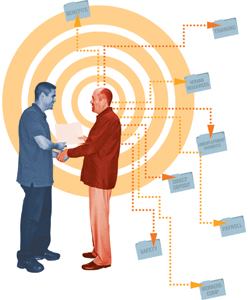MORE INFORMATION
• In These Times Archives
View all the articles in our series that provides practical information on doing business in a challenging economy.
As a certified public accountant, Stan Griffin used to head the audit staff of the state of South Carolina. But even with this experience, once he entered the pool industry he didn’t want to be bothered with payroll and other human resources issues.
“We in the pool and spa industry need to put all our efforts into the pool and spa industry,” says the president of Griffin Pools and Spas in Columbia, S.C., a Pool & Spa News Top Builder. “The processing of payroll is just a necessary evil.”
So instead of handling his own payroll, sending in tax records or even managing employees’ benefits, he’s turned to a professional employment organization to complete these tasks.
Besides saving time, Griffin says the move has given him peace of mind. Here, he explains how it works.
Changing focus
Originally, Griffin had hired a company to process his payroll. But he felt it wasn’t enough.
“All they do is write the checks,” he says. “We still had to do the human resource functions, handle medical insurance, and most everything else.” So Griffin switched to a professional employment organization.
“They hire all of my employees and contract them back to me,” Griffin says. “The [firm] is the employer of record for tax, insurance, workman’s compensation and employer liability purposes. But I, as a company owner, still maintain complete control over my employees because they’re contracted back to me. So I hire, fire and do everything that I normally would do.”
For the payroll portion, all Griffin does is log onto a Website and enter the amount each employee is owed for a given pay period. The next day, direct deposits are made and checks are sent to each of the pool company’s seven locations. Griffin receives a statement itemizing wages, Social Security and unemployment payments. The professional employment organization automatically debits the total amount from Griffin’s account.
“They do the quarterly reports, the federal withholding — everything, just like we are employees of theirs,” Griffin says. “It relieves us of all these petty things with payroll that we don’t have time or the expertise to do.”
Because he enters the payroll information online, the task can be handled from anywhere with an Internet connection.
Working with people
In addition to payroll, the professional employment organization handles human resources issues.
The firm handles workman’s compensation claims and safety training, and even performs random drug testing. It also helps his company become better with sensitive situations. “They train our supervisors on how to handle human resource issues,” Griffin says.
He also likes the backup he receives in situations with difficult personnel. “If we fire someone, or lay them off, and want to contest that person drawing unemployment for whatever reason, the company sends a representative with us to the hearing.”
Professional employment organizations also negotiate favorable rates for health benefits, workman’s compensation, general liability insurance and retirement plans. “They have tens of thousands of employees, so when they go to get workman’s comp insurance, they’re [in a stronger position],” Griffin says.
The savings his company sees from this helps recoup some of the money Griffin spends on the service itself, which collects about 2 percent of each payroll. This fee is automatically deducted from Griffin’s account along with the payroll. With the efficiencies, however, Griffin estimates the company costs closer to 1 percent.
Considering the backup he receives preventing potentially costly safety mistakes and late payroll-tax payments, the savings become indefinable.
“They will take on companies as little as five or six people,” Griffin adds. “To me, there’s no reason that even the smallest company should not use this service, just because of the sheer fact of what they’re going to save on general liability insurance.”
Share your thoughts on this article with Pool & Spa News.




